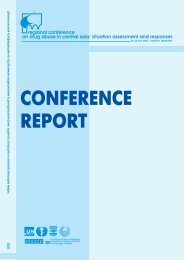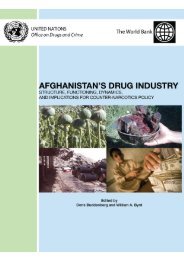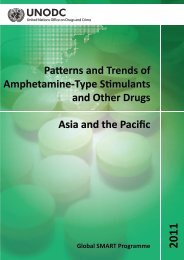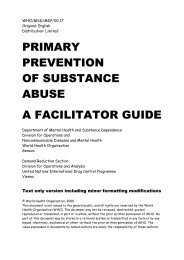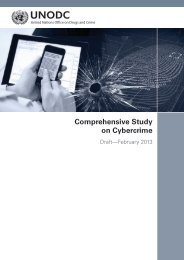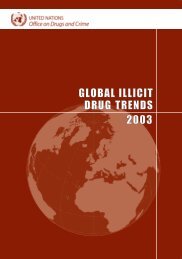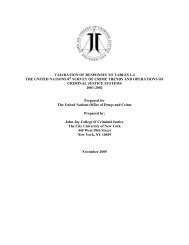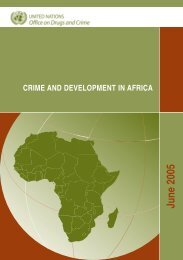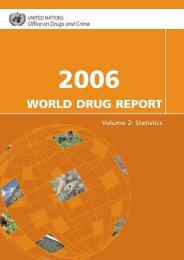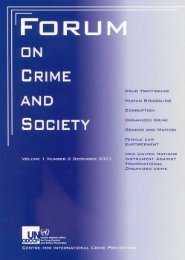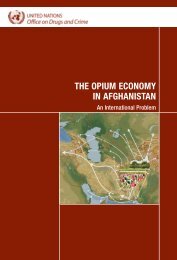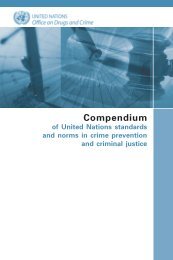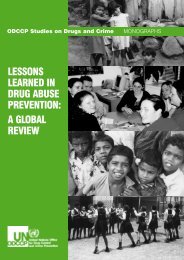Drug abuse in Pakistan - United Nations Office on Drugs and Crime
Drug abuse in Pakistan - United Nations Office on Drugs and Crime
Drug abuse in Pakistan - United Nations Office on Drugs and Crime
Create successful ePaper yourself
Turn your PDF publications into a flip-book with our unique Google optimized e-Paper software.
INTERVIEWS WITH DRUG ABUSERS<br />
Table 15.<br />
Sample demographics <strong>and</strong> first treatment c<strong>on</strong>tact<br />
Treatment Street Pris<strong>on</strong> All<br />
Mean age 33 33 31 32<br />
Treatment c<strong>on</strong>tact<br />
Percentage last year — 18 19 19<br />
Percentage ever — 52 37 44<br />
Mean age first treatment 26 25 26 26<br />
First treatment<br />
Percentage under 20 years old 18 21 15 18<br />
Percentage 20-29 years old 56 55 55 55<br />
Percentage 30-39 years old 21 20 23 21<br />
Percentage 40 years old <strong>and</strong> above 6 4 7 6<br />
treatment <strong>and</strong> pris<strong>on</strong> sample <strong>and</strong> 25 years of age for<br />
the street sample. Summary data <strong>on</strong> sample demographics<br />
<strong>and</strong> age of first treatment episode can be<br />
found <str<strong>on</strong>g>in</str<strong>on</strong>g> table 15.<br />
The mean age from first use of hero<str<strong>on</strong>g>in</str<strong>on</strong>g> to first treatment<br />
admissi<strong>on</strong> was calculated at 4.6 years. This is<br />
typical of many studies of hero<str<strong>on</strong>g>in</str<strong>on</strong>g> users c<strong>on</strong>ducted<br />
<str<strong>on</strong>g>in</str<strong>on</strong>g>ternati<strong>on</strong>ally, that generally f<str<strong>on</strong>g>in</str<strong>on</strong>g>d a lag of between<br />
three <strong>and</strong> six years after <str<strong>on</strong>g>in</str<strong>on</strong>g>itiati<strong>on</strong> of use before seek<str<strong>on</strong>g>in</str<strong>on</strong>g>g<br />
assistance. However, there is c<strong>on</strong>siderable<br />
<str<strong>on</strong>g>in</str<strong>on</strong>g>dividual variati<strong>on</strong> <strong>on</strong> this measure with some <str<strong>on</strong>g>in</str<strong>on</strong>g>dividuals<br />
rapidly develop<str<strong>on</strong>g>in</str<strong>on</strong>g>g problems that had led<br />
them to seek help <strong>and</strong> support. Others wait for c<strong>on</strong>siderable<br />
periods of time before they decide, or are<br />
able, to seek help.<br />
Need for treatment<br />
Resp<strong>on</strong>dents were asked whether it was difficult to<br />
get <str<strong>on</strong>g>in</str<strong>on</strong>g>to treatment <str<strong>on</strong>g>in</str<strong>on</strong>g> their area. Most (64%) replied<br />
that this was the case, with 53% of treatment attendees,<br />
62% of the street sample, <strong>and</strong> 80% of the<br />
pris<strong>on</strong> sample report<str<strong>on</strong>g>in</str<strong>on</strong>g>g it was difficult for drug<br />
<str<strong>on</strong>g>abuse</str<strong>on</strong>g>rs to enter treatment <str<strong>on</strong>g>in</str<strong>on</strong>g> their area.<br />
All resp<strong>on</strong>dents were asked whether they had everwanted<br />
help for a drug problem but that they had<br />
been unable to receive it. Overall, 66% of those <str<strong>on</strong>g>in</str<strong>on</strong>g>terviewed<br />
reported that this had been the case. Perhaps<br />
not surpris<str<strong>on</strong>g>in</str<strong>on</strong>g>gly, those currently <str<strong>on</strong>g>in</str<strong>on</strong>g> treatment were<br />
significantly less likely to report a previous failure to<br />
access help than those <str<strong>on</strong>g>in</str<strong>on</strong>g> the street or pris<strong>on</strong><br />
samples. In the treatment group, 48% of resp<strong>on</strong>dents<br />
reported an experience of not be<str<strong>on</strong>g>in</str<strong>on</strong>g>g able to access<br />
treatment as compared to 85% <strong>and</strong> 73%, respect<br />
ively, <str<strong>on</strong>g>in</str<strong>on</strong>g> the street <strong>and</strong> pris<strong>on</strong> groups. The reas<strong>on</strong>s<br />
for fail<str<strong>on</strong>g>in</str<strong>on</strong>g>g to access treatment were explored <str<strong>on</strong>g>in</str<strong>on</strong>g> a<br />
follow-up questi<strong>on</strong>. The overwhelm<str<strong>on</strong>g>in</str<strong>on</strong>g>g majority<br />
resp<strong>on</strong>se (80% of all resp<strong>on</strong>dents, 70% of treatment<br />
group, 84% of the street sample <strong>and</strong> 85% of the<br />
pris<strong>on</strong> sample) was that they could not afford the<br />
f<str<strong>on</strong>g>in</str<strong>on</strong>g>ancial cost of enter<str<strong>on</strong>g>in</str<strong>on</strong>g>g treatment. Other reas<strong>on</strong>s<br />
reported were a lack of available places (23%), a lack<br />
of <str<strong>on</strong>g>in</str<strong>on</strong>g>patient facilities <str<strong>on</strong>g>in</str<strong>on</strong>g> government hospitals, a dislike<br />
of the treatment regime <strong>on</strong> offer (7%), a dislike<br />
of the treatment agency (7%), <strong>and</strong> a dislike of treatment<br />
staff (5%).<br />
Street <strong>and</strong> pris<strong>on</strong> recruited resp<strong>on</strong>dents were also<br />
asked to rate their own current need for treatment.<br />
Eighty-<strong>on</strong>e per cent of those <str<strong>on</strong>g>in</str<strong>on</strong>g>terviewed <strong>on</strong> the<br />
streets <strong>and</strong> 72% of those <str<strong>on</strong>g>in</str<strong>on</strong>g>terviewed <str<strong>on</strong>g>in</str<strong>on</strong>g> pris<strong>on</strong><br />
reported that they currently needed treatment for<br />
their drug problem. The f<str<strong>on</strong>g>in</str<strong>on</strong>g>d<str<strong>on</strong>g>in</str<strong>on</strong>g>g that drug <str<strong>on</strong>g>abuse</str<strong>on</strong>g>rs<br />
who are not current <str<strong>on</strong>g>in</str<strong>on</strong>g> c<strong>on</strong>tact with treatment services<br />
recognize their need for them is not a universal<br />
<strong>on</strong>e. Studies that <str<strong>on</strong>g>in</str<strong>on</strong>g>terview drug users <str<strong>on</strong>g>in</str<strong>on</strong>g> community<br />
sett<str<strong>on</strong>g>in</str<strong>on</strong>g>gs often f<str<strong>on</strong>g>in</str<strong>on</strong>g>d that there is a reluctance<br />
am<strong>on</strong>g drug us<str<strong>on</strong>g>in</str<strong>on</strong>g>g resp<strong>on</strong>dents to recognize themselves<br />
that they have a need for treatment, even<br />
where c<strong>on</strong>siderable evidence exists to suggest that<br />
this is the case. C<strong>on</strong>siderable efforts have been<br />
<str<strong>on</strong>g>in</str<strong>on</strong>g>vested <str<strong>on</strong>g>in</str<strong>on</strong>g> many countries <str<strong>on</strong>g>in</str<strong>on</strong>g> attract<str<strong>on</strong>g>in</str<strong>on</strong>g>g drug <str<strong>on</strong>g>abuse</str<strong>on</strong>g>rs<br />
<strong>and</strong> particularly hero<str<strong>on</strong>g>in</str<strong>on</strong>g> <str<strong>on</strong>g>abuse</str<strong>on</strong>g>rs <str<strong>on</strong>g>in</str<strong>on</strong>g>to services.<br />
It is therefore encourag<str<strong>on</strong>g>in</str<strong>on</strong>g>g that <str<strong>on</strong>g>in</str<strong>on</strong>g> this study most<br />
subjects recognized that they had a need for help.<br />
27



